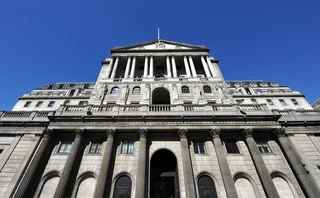
Stress tests were ignored in lead-up to crisis, Basel risk head says
Banks around the world ignored and marginalised the severe stress tests that could have prepared them for the crisis, according to Klaas Knot, the head of the Basel Committee's risk monitoring and management group.
Knot's group, part of the Bank for International Settlements' Basel Committee on Banking Supervision, issued a set of draft principles this week on improving stress testing in order to better protect the financial system against future crises.
The stress tests that banks performed were far too mild, Knot said - they typically modelled only minor stresses affecting a single business line, leaving firms unprepared for the severe system-wide crisis that they faced. Equally damaging was the failure of senior management to take the tests seriously.
"We spoke to a lot of industry participants who worked on designing stress testing regimes within their bank and they simply told us that 'we could design whatever we wanted, but senior management and the board were just not interested. To the extent that we tried to design severe stress tests, we were almost laughed away, with the response that this was so inconceivable and don't waste our time with something so remote.' So there was also an issue with senior management's involvement," Knot said.
Knot is also director of supervision policy at the Netherlands Bank, where he encountered this reluctance personally. "In spring 2007 we asked [all Dutch banks] what would happen if liquidity in the market for asset-backed commercial paper (ABCP) conduits completely dried up - the reputational risk would force them to take all these conduits back on balance sheet. We had a huge fight with our banks... [they said] 'we're not going to calculate something so irrelevant, there will always be a market, sometimes prices will be higher but the market will always be there'.
"Well, we've seen what happened a year later was precisely this - the market for ABCP conduits completely dried up, and many of the institutions had to finance these conduits they had sponsored themselves or take the assets back on balance sheet. If banks had been willing to at least contemplate this possibility they would have done this kind of stress test years ago and would have been much more aware of the contingent liabilities they had."
The modelling group called for more severe and widespread scenarios for stress tests, and greater involvement with the tests at senior management and board level.
See also: BIS releases roadmap to better stress testing
Stress testing next on the agenda for Basel Committee
Basel Committee outlines potential changes to Basel II
Only users who have a paid subscription or are part of a corporate subscription are able to print or copy content.
To access these options, along with all other subscription benefits, please contact info@risk.net or view our subscription options here: http://subscriptions.risk.net/subscribe
You are currently unable to print this content. Please contact info@risk.net to find out more.
You are currently unable to copy this content. Please contact info@risk.net to find out more.
Copyright Infopro Digital Limited. All rights reserved.
As outlined in our terms and conditions, https://www.infopro-digital.com/terms-and-conditions/subscriptions/ (point 2.4), printing is limited to a single copy.
If you would like to purchase additional rights please email info@risk.net
Copyright Infopro Digital Limited. All rights reserved.
You may share this content using our article tools. As outlined in our terms and conditions, https://www.infopro-digital.com/terms-and-conditions/subscriptions/ (clause 2.4), an Authorised User may only make one copy of the materials for their own personal use. You must also comply with the restrictions in clause 2.5.
If you would like to purchase additional rights please email info@risk.net
More on Regulation
Swiss report fingers Finma on Credit Suisse capital ratio
Parliament says bank would have breached minimum requirements in 2022 without regulatory filter
‘It’s not EU’: Do government bond spreads spell eurozone break-up?
Divergence between EGB yields is in the EU’s make-up; only a shared risk architecture can reunite them
CFTC weighs third-party risk rules for CCPs
Clearing houses could be required to formally identify and monitor critical vendors
Why there is no fence in effective regulatory relationships
A chief risk officer and former bank supervisor says regulators and regulated are on the same side
Snap! Derivatives reports decouple after Emir Refit shake-up
Counterparties find new rules have led to worse data quality, threatening regulators’ oversight of systemic risk
Critics warn against softening risk transfer rules for insurers
Proposal to cut capital for unfunded protection of loan books would create systemic risk, investors say
Barr defends easing of Basel III endgame proposal
Fed’s top regulator says he will stay and finish the package, is comfortable with capital impact
Bank of England to review UK clearing rules
Broader collateral set and greater margin transparency could be adopted from Emir 3.0, but not active accounts requirement







